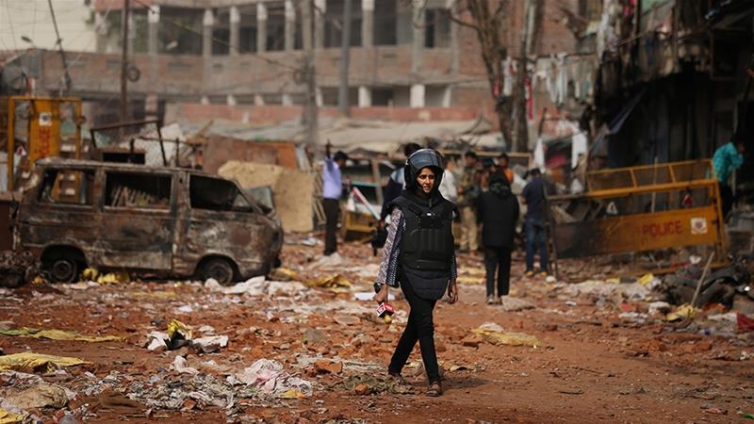Indian police have filed charges against 15 people over Hindu-Muslim riots in the capital, a spokesman said on Thursday, prompting criticism from rights groups that authorities were targeting the opposition and minority Muslims.
February's violence killed more than 50 people and drove thousands from their homes, most of them members of the Muslim minority, which forms about 15 percent of the country's roughly 1.3 billion population.
The riots followed months of protests against a new citizenship law that critics say discriminates against Muslims. The Citizenship Amendment Act (CAA), passed last December, fast-tracks nationality for minorities from three neighbouring countries but excludes Muslims.
The charges were filed in a court in eastern New Delhi, said police spokesman Anil Mittal, adding that the evidence against the accused runs to more than 17,000 pages.
Mittal did not identify those charged, but domestic media have named former members of two opposition parties and academics at one of the main protest sites, the Muslim-dominated university of Jamia Millia Islamia.
Arbitrary arrests
"By arbitrarily arresting outspoken activists, the government is not only attempting to silence dissent but also sending a message to supporters that they have free rein to commit abuses against minority communities," said Meenakshi Ganguly, South Asia director of New York-based Human Rights Watch.
Why is India’s citizenship law causing so much anger?| Start Here
Prashant Bhushan, a Supreme Court lawyer and vocal government critic, said the charge-sheet was "farcical".
Broadcaster NDTV called the investigation a "whitewash", adding that several members of the ruling Hindu nationalist Bharatiya Janata Party made incendiary speeches hours before February's riots but had escaped censure.
Amnesty International India in its report published last month accused Delhi police of "complicity and bias" in the February violence.
The government and Delhi police have defended their handling of the case, saying those involved in the riots will be punished regardless of political or religious ties.
This latest move follows the arrest of a former student leader who was arrested on Sunday for his alleged role in the February violence, a move denounced by activists as "a witch-hunt exercise".
Umar Khalid, 33, was arrested under the stringent Unlawful Activities (Prevention) Act (UAPA) in connection with the riots.
Legal experts have questioned the police's application of the UAPA on students and activists, as the law reduces the scope for bail, meaning jail terms without trial.
Latest Stories
-
EPA says lead-based paints are dangerous to health, calls for safer alternatives
1 hour -
Queenmother calls on President-elect Mahama to appoint more women in his government
3 hours -
Atletico Madrid beat Barcelona to go top of La Liga
4 hours -
Usyk breaks Fury’s heart with points win in rematch
4 hours -
Ghana-Russia Centre to run Russian language courses in Ghana
9 hours -
The Hidden Costs of Hunger: How food insecurity undermines mental and physical health in the U.S.
10 hours -
18plus4NDC marks 3rd anniversary with victory celebration in Accra
12 hours -
CREMA workshop highlights collaborative efforts to sustain Akata Lagoon
13 hours -
2024/25 Ghana League: Heart of Lions remain top with win over Basake Holy Stars
14 hours -
Black Queens: Nora Hauptle shares cryptic WAFCON preparation message amid future uncertainty
14 hours -
Re-declaration of parliamentary results affront to our democracy – Joyce Bawah
14 hours -
GPL 2024/25: Vision FC score late to deny Young Apostles third home win
14 hours -
Enhancing community initiatives for coastal resilience: Insights from Keta Lagoon Complex Ramsar Site Workshop
14 hours -
Family Health University College earns a Presidential Charter
15 hours -
GPL 2024/25: Bibiani GoldStars beat Nsoatreman to keep title race alive
15 hours

